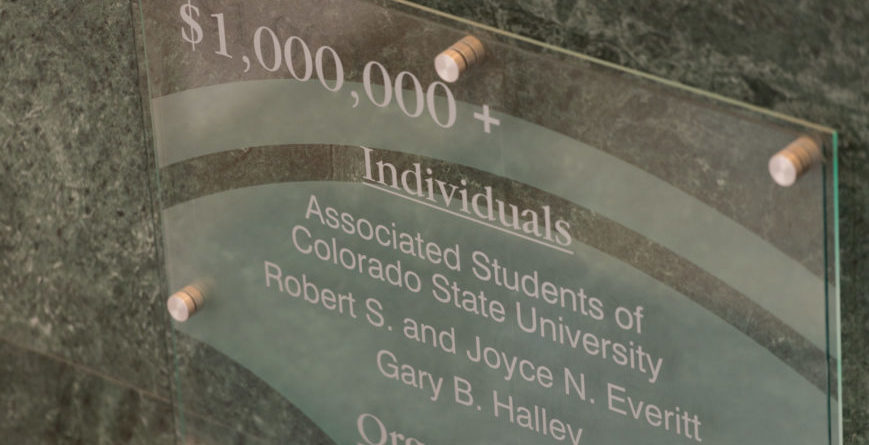
Student fees approved in 2006 by students who most likely graduated before the building opened in 2010 provided more than $1 million for construction of the College of Business’ Rockwell Hall West.
The sun-lit lobby of the College of Business’ Rockwell Hall West displays a plaque: “Special thanks to all of the students of Colorado State University, and their representatives who served on the student-led University Facility Fee Advisory Board, who through their support and leadership have demonstrated their commitment to build an even better university and community.”
It’s a public reminder that the physical fabric of CSU’s campus – from academic buildings to spaces for down time – is funded in large part by students, for students.
Every CSU student pays a variety of fees, vetted and voted on by fellow students. The Student Fee Review Board, which operates under Associated Students of Colorado State University, oversees the allocation of about $55 million in student fees annually. These funds support many areas, including the Lory Student Center, the Campus Recreation Center, the CSU Health and Medical Center, Student Legal Services, and others.
The University Facility Fee Advisory Board is a student-run committee of the Student Fee Review Board. UFFAB’s mission is to allocate facility fees toward construction and upgrade projects for academic spaces all over campus. The projects include relatively small endeavors like technical upgrades to classrooms, as well as major, game-changing investments, like Rockwell West, the Computer Science Building, the Behavioral Sciences Building, and the new Biology Building currently under construction.
A similar board, the University Technology Fee Advisory Board, decides how to spend a yearly technology fee, also paid by all students. That money goes to everything from wireless network upgrades to computer hardware – all for the benefit of current and future students.
Greatest impact on students
Recent CSU alumnus Sam Laffey, who served on UFFAB and other areas of student government, said facility fees in particular “have a tremendous impact on CSU as a whole.”
“Of all the student fees that students at CSU pay, UFFAB (with the likely exception of our sister fee board UTFAB) has the greatest impact on students,” Laffey said. “Every single student will walk into a classroom that we refurbished, a building that we built, or study in the student areas that we funded.”
Browsing through the extensive UFFAB minutes tells that tale. Student board members scrutinize projects with a mindful eye toward benefitting the greatest numbers of their peers. They ask tough questions. They listen carefully to administrators and faculty members charged with making the case for buildings, upgrades and equipment.
“The students are in charge and make their decisions to benefit the entire student body,” Laffey continued. “UFFAB provides a critical service by, in combination with alumni donations and the university itself, ensuring that CSU remains academically competitive, aesthetically pleasing to visitors and potential students, and can provide a first-rate education at an affordable price.”
Mission critical
The impact of students fees is acknowledged as mission critical by university leadership.
“The UFFAB is important to both the university’s academic mission, as well as all the students, because it enables us to deliver facilities that we would otherwise not be able to provide,” said Lynn Johnson, vice president for university operations. “The entire portfolio of student fees, and the resources they generate, are extremely important to the services we are able to offer to our students, and they are driven by student demand.”
Angie Nielsen, director of the Office of Budgets, and Mike Ellis, assistant vice president and executive director of the Lory Student Center, serve as advisors to the Student Fee Review Board, working closely with the students. As advisors they provide guidance throughout the academic year, assisting the students in learning about the fees and related services. This wealth of information is relied upon by the student decision-makers for each year’s fees, including the facility fee.
Related processes include working with ASCSU and SFRB leadership to update the Institutional Plan for Student Fees, and setting fall tours as well as spring budget meetings for SFRB with each of the fee-funded areas. Directors of each fee area create proposals, which are reviewed, debated and decided upon by SFRB, resulting in a recommended Fee Package.
Once completed, the Fee Package is submitted to ASCSU, President Tony Frank and the Board of Governors for review and approval.